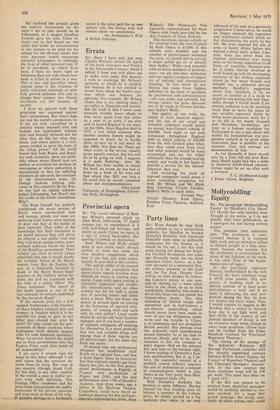Provincial opera
Sir: The 'social relevance' of Rod- ney Milnes's personal attack on
Alan Blyth (SPECTATOR, 17 April) escapes me, so encumbered is it with half-baked red herrings; and surely, to quote Tynan on opera is a sign of critical bankruptcy, like quoting Goebbels on democracy.
Both Milnes and Blyth would seem to care about opera, though neither of them has made any very positive suggestions about how it can best and most econo- mically be provided in this country. The central oddity of the present system (?) is the assumption that opera-lovers outside London must depend on trains or touring com- panies. Large-scale opera touring is extremely expensive and artistic- ally unsatisfactory, and no other country has hit on such a messy way of pouring money and talent down a drain. Why not divert the money at present spent on touring to the formation of regional com- panies, of varying sizes and each with its own policy? Local needs would be served and local loyalties engaged; and if you have a number of regional companies all thinking for themselves, it is more probable that new and valuable things will emerge than if those regions are all patronisingly fed the same diet from one centre.
At present only one professional company has established itself firmly on a regional base, and that is Kent Opera. Since its formation less than eighteen months ago Kent Opera has put on the first profes- sional performance in English of Poppea, new productions of Figaro and Dido, and the first performance since 1736 of Handel's Atalanta. And three weeks ago a visitor to the Marlowe Theatre, Canterbury, could have heard an audience cheering the first perform- ,ance of a contemporary work, Alan
Ridout's The Pardoner's Tale (specially commissioned for Kent Opera with funds provided by the Arts Council of Great Britain).
The maximum annual subsidy so far received from the Arts Council by Kent Opera is £3,000; if this subsidy, were doubled and the number of performances remained the same, we should still be serving a larger public per £1 of subsidy than Sadler's Wells—and certainly with no lower standard of perform- ance: we use first-class orchestras and our regular company of singers are of national and international standing. In fact much of our finance has come from 'hidden subsidies' in the form of sacrifices by performers and administration —all very noble and splendid, but wrong—unless the same demands are to be made at Covent Garden and Sadler's Wells.
The quality of our work, the extent of local financial support, and the size of our actual and potential audiences would justify an annual Arts Council subsidy of £20,000. Now eight or ten such companies - throughout England with an initial subsidy of £20,000 from the Arts Council (plus what- ever they could raise from local and other sources) would be more economical and far, far richer artistically than the present touring system, and would at last begin to provide a service for the 'masses' (whoever they are). And reviewing the work of regional companies could prove a more rewarding occupation for both Mr Milnes and Mr Blyth than knocking Covent Garden, Sadler's Wells or each other.
Norman Platt Artistic Director, Kent Opera, Pembles Cross, Egerton, Ashford, Kent


































 Previous page
Previous page